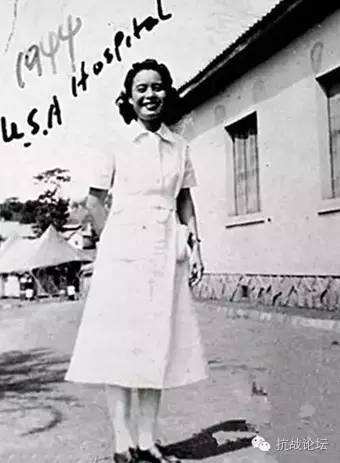2007年路透社的报道: 一名传奇的“飞虎队”中国女护士
12年前,2007年6月6日路透社有关 “驼峰天使” 飞虎队女护士黄欢笑的报道
文章原标题: “飞虎队”的中国女护士离世 享年95岁
北京(路透社) – 一名传奇的中国护士在第二次世界大战期间看护受伤的美国飞虎队飞行员离世,享年95岁,官方媒体周四报道(June 5, 2007)。

据“中国日报”报道,在中国西南部省份云南省昆明市生活一直不愿透露姓名的丽塔·黄(Rita Wong),六十年前,从沦陷的香港逃离日本人控制区前往西南参加飞虎队。
“飞虎队医院护士丽塔·黄的故事可能是第二次世界大战中最动人的故事之一”中国日报之前报道过,对她致敬。
飞虎队是美国志愿者组织的绰号,该志愿者组织组建了一支在中国接受训练的战斗机组,并在美国加入战争之前,为喜马拉雅山脉中的“驼峰航线”捍卫中国物质供应线。
这些飞机上涂有鲨鱼牙,飞行员因其勇气在中国被称为“飞虎”(飞虎队)。 “飞虎队”于1942年成为由约翰·韦恩主演的电影。
据“中国日报”报道,上个世纪初,当大多数中国女孩十几岁结婚并留在家中后,丽塔·黄,中文名黄欢笑,决定接受教育,成为一名专业人士。
她刚刚完成了护理课程,并开始在香港的一家医院实习,1941年的圣诞节时,日本军队袭击和接管了香港。
据“中国日报”报道,“所有在医院工作的外国人都被送往集中营,中国人被集中在医院,在那里他们无所事事,只能等待他们微薄的口粮。”
日本人规定,不允许任何医生或护士离开香港,被捕的人会被杀害。
“但黄决心逃离。一天晚上,她和她的哥哥漂浮在一个小舢板上,她的哥哥之前在九龙,后回到了澳门,“她在一家教会医院工作,每天看到有数十人死于缺药。
当她得知她的几个同学在中国战时首都重庆的美国医院工作时,黄决定去加入他们。
她的哥哥陪同她一直从澳门到重庆1000多公里(600英里)的危险旅程。
“到了重庆,她去了盟军的总部,出示了她的护理证书并申请了工作。有人告诉她,云南急需讲英语的护士,第二天就被派往该省首府昆明的一家医院。“
这原来是美国第十四航空队的一家医院。喜马拉雅山上空的飞行非常危险,飞机几乎每天都在坠毁。 丽塔·黄在她的日记中回忆道,大多数时候都没法找到坠毁飞机的飞行员。
“中国日报”报道,在以后的生活中,她曾经遭受到不公平对待,特别是1966-1967年文化大革命期间。
新华社援引黄欢笑的长子高德敏的话说:“她最后是面带微笑安详辞世,就像她的中文名字所暗示的那样,转化为喜悦和微笑。”
在丽塔·黄的晚年时,一些来自美国前飞虎队及其后裔,以及中国飞行员的后代探望了她。
Nick Macfie 尼克麦克菲
路透社世界新闻
2007年6月6日/下午7:57

路透社报道全文
China nurse for U.S. “Flying Tigers” dies at 95
BEIJING (Reuters) – A legendary Chinese nurse who cared for injured U.S. Flying Tigers airmen during World War Two and suffered beatings during the Cultural Revolution has died at 95, state media said on Thursday.
Rita Wong, who escaped the Japanese in Hong Kong to join the Flying Tigers in China, had lived in anonymity in Kunming, capital of China’s southwestern province of Yunnan, for the past six decades, the China Daily said.
“The story of Rita Wong, the only Chinese nurse at the hospital for the Flying Tigers, could be one of the most touching tales of World War Two,” the China Daily said in a tribute last year.
The Flying Tigers was the nickname for the American Volunteer Group that formed a fighter group that trained in China and defended the Burma supply line to China over the Himalayas known as the “Hump” before the United States entered the war.
The airmen, whose planes were painted with shark teeth, were known in China as “Fei Hu” (Flying Tigers) for their courage. “Flying Tigers” became a movie starring John Wayne in 1942.
At the beginning of the last century, when most Chinese girls married in their teens and stayed at home afterwards, Wong, also known as Huang Huanxiao, decided that she should receive an education and become a professional, the China Daily said.
She had just finished her course in nursing and started her internship at a hospital in Hong Kong, when Japanese troops attacked and took over on Christmas Day, 1941.
“All foreigners working at the hospital were sent to a concentration camp, and the Chinese were gathered at a hospital where they had nothing to do but wait for their meager food rations,” the China Daily said.
The Japanese made it a rule that no doctors or nurses were to leave Hong Kong and those who were caught doing so would be killed.
“But Wong was determined to flee. One night, on a small sampan, she floated with her brother, who was also in Kowloon, back to Macau” where she worked at a church hospital and saw dozens of people die every day for lack of medicine.
When she learnt that several of her classmates were working at the American hospital in Chongqing, the wartime capital of China, Wong decided that she would go and join them.
Her brother accompanied her on the dangerous trip of more than 1,000 km (600 miles) from Macau to Chongqing.
“Once there she went to the headquarters of Allied Forces, showed her nursing certificate and applied for a job. She was told that English-speaking nurses were badly needed in Yunnan and was sent the next day to a hospital in Kunming, capital of the province.”
It turned out to be a hospital of the US 14th Air Force.
The flights over the Himalayas were so dangerous that planes crashed almost every day. Most often the airmen were never found, Wong recalled in her diary.
Later in life, she would suffer a hunched back, the victim of “beatings during the 1966-1967 Cultural Revolution”, the China Daily said last year. It did not elaborate.
“She died with a smile, just like her Chinese name suggests – it translates into joy and smile,” Xinhua news agency quoted Gao Demin, Wong’s eldest son, as saying.
During Wong’s final years, she was visited by some former Flying Tigers and their descendants from the United States, and descendants of Chinese pilots.
Nick Macfie
World News
June 6, 2007 / 7:57 PM /




